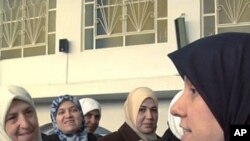International Women's Day is an opportunity to look at a variety of issues, including the portrayal of women in the media. A number of activists are working to improve the image of Islamic women, particularly as they often suffer from stereotypes, generalizations and misconceptions.
The hijab is simply a head cover, says Syrian-based activist Huda al-Habash in the documentary Veiled Voices. She says, in her words, "it is not in conflict with openness and freedom."
American filmmaker Brigid Maher explains the title of her movie, which focuses on several inspirational female Islamic religious leaders in the Middle East.
"We thought Veiled Voices was appropriate because American audiences might at first think that these women's voices are veiled. In fact, they are not veiled at all so it kind of eludes to the stereotype if you will," Maher said.
U.S-based media critic Fatemeh Fakhraie says these stereotypes are unfortunately not lacking and not getting better, either.
"There is the stereotype of Muslim women as oppressed victims but increasingly the most prevalent image of Muslim women is one of a dangerous and subversive Muslim woman," Fakhraie said.
She is the editor of the Muslimah Media Watch website, where Muslim women discuss their image in media and popular culture. Fakhraie points to one disturbing example from Switzerland.
"During the minaret ban campaign, there was a poster that had this scowling Muslim woman and she appeared in front of this field of minarets, that looked like nukes through the Swiss flag, a very menacing image," she said.
The Swiss ban on new minarets passed in a referendum in November 2009. Fakhraie says it is not only for political campaigns that Muslim women are viewed in a negative light. She says lots of western journalists are fascinated by female suicide bombers, and also tend to lump all Muslim women into one category.
"The biggest things I see in the media that really irritate me are the idea that Muslim women can be distilled into this monolithic group. You will see a story that says Muslim women do this, or Muslim women have to wear this, and we cannot be distilled into a monolithic group. I think also this is another big irritation of mine, you will often see pictures of random Muslim women used to illustrate an article about Islam or about Muslim women in a specific country and there will not be any captions. This woman will not have a name or she will not be given a context. You do not know which country she is coming from," Fakhraie said.
Filmmaker Maher says she noticed this trend even among people who enjoyed her film.
"I just recently got a very positive review online about the film but the film was criticized because the women all look like they were not poor and they were not struggling, and so therefore it was not representative of women in the Middle East. And although there is poverty in the Middle East, like there is poverty everywhere, there also is an emerging middle class, and so I think that we are constantly fighting our stereotypes, whether it is in regards to women's position in religion or whether it is how they are dealing (with) and fighting patriarchy or even in terms of their economic situation. There is a lot that needs to be illuminated and revealed about really who they are in their society," Maher said.
Two of the female religious leaders portrayed in the film are influential television personalities who give advice and guidance on religion and social issues in Lebanon and Egypt.
Fakhraie says more and more Muslim women around the world are turning to the Internet to give themselves a louder and more distinct voice.
"A wonderful thing I have noticed is that Muslim women themselves are creating their own spaces, online especially, plenty of Muslim blogs have been popping up the last several years and I think this is one of the best ways to combat all these stereotypes, finding out about us from us, we are the best source on ourselves," Fakrraie said.
To coincide with International Women's Day Monday, the film Veiled Voices was broadcast several times on the American cable channel Link TV, which specifically tries to present issues not often covered in U.S. media.
News
Activists Unveil Positive Power and Diversity of Muslim Women

Films, websites offer alternatives to stereotypes, generalizations, misconceptions



